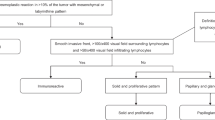Abstract
Transforming growth factor-beta 1 (TGF-β1) plays an important role in the pathogenesis of multiple malignancies, and its expression also strongly affects the outcomes of cancer patients. The objective of this study was to determine the clinical significance of the serum levels of TGF-β1 in epithelial ovarian cancer (EOC) patients. A total of 50 patients with a pathologically confirmed diagnosis of EOC were enrolled into this study. Serum TGF-β1 concentrations were determined by the solid-phase sandwich ELISA method. Thirty age- and sex-matched healthy controls were included in the analysis. Median age of patients was 56.5 years old (range 22 to 83 years). Majority of the patients had advanced disease (FIGO stage III–IV; 90 %). There was no significant difference in baseline serum TGF-β1 levels between EOC patients and the controls (p = 0.39). A trend to significant relationship was found between the serum levels of TGF-β1 and stage of disease (p = 0.06). The elevated serum TGF-β1 level was associated with metastatic disease. The other known clinical variables including histology, grade of histology, debulking surgery, and serum CA 125 levels were not found to be correlated with serum TGF-β1 concentrations (p > 0.05). Only the chemotherapy-unresponsive patients had higher serum TGF-β1 levels compared with responsive ones (p = 0.02). Serum TGF-β1 concentration was found to have no prognostic role for both progression-free and overall survivals (p = 0.42 and p = 0.09, respectively). In conclusion, although the serum level of TGF-β1 has no diagnostic and prognostic role, it is associated with sensitivity to standard chemotherapy in EOC patients.



Similar content being viewed by others
References
Massague J. TGF beta in cancer. Cell. 2008;134:215–30.
Komiyama S, Kurahashi T, Ishikawa M, Tanaka K, Komiyama M, Mikami M, et al. Expression of TGFβ1 and its receptors is associated with biological features of ovarian cancer and sensitivity to paclitaxel/carboplatin. Oncol Rep. 2011;25:1131–8.
Liu C, Zhang L, Chang X, Cheng Y, Cheng H, Ye X, et al. Overexpression and immunosuppressive functions of transforming growth factor 1, vascular endothelial growth factor and interleukin-10 in epithelial ovarian cancer. Chin J Cancer Res. 2012;24:130–7.
Nakanishi Y, Kodama J, Yoshinouchi M, Tokumo K, Kamimura S, Okuda H, et al. The expression of vascular endothelial growth factor and transforming growth factor-beta associates with angiogenesis in epithelial ovarian cancer. Int J Gynecol Pathol. 1997;16:256–62.
Sonmezer M, Gungor M, Ensari A, Ortac F. Prognostic significance of tumor angiogenesis in epithelial ovarian cancer: in association with transforming growth factor beta and vascular endothelial growth factor. Int J Gynecol Cancer. 2004;14:82–8.
Gordinier ME, Zhang HZ, Patenia R, Levy LB, Atkinson EN, Nash MA, et al. Quantitative analysis of transforming growth factor beta 1 and 2 in ovarian carcinoma. Clin Cancer Res. 1999;5:2498–505.
Conflicts of interest
None
Author information
Authors and Affiliations
Corresponding author
Rights and permissions
About this article
Cite this article
Tas, F., Karabulut, S., Serilmez, M. et al. Clinical significance of serum transforming growth factor-beta 1 (TGF-β1) levels in patients with epithelial ovarian cancer. Tumor Biol. 35, 3611–3616 (2014). https://doi.org/10.1007/s13277-013-1476-6
Received:
Accepted:
Published:
Issue Date:
DOI: https://doi.org/10.1007/s13277-013-1476-6




